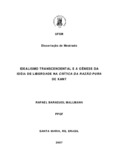| dc.creator | Mallmann, Rafael Barasuol | |
| dc.date.accessioned | 2007-11-27 | |
| dc.date.available | 2007-11-27 | |
| dc.date.issued | 2007-08-10 | |
| dc.identifier.citation | MALLMANN, Rafael Barasuol. Transcendental idealism and the genesis of the idea of freedom in Kant s Critique of Pure Reason. 2007. 134 f. Dissertação (Mestrado em Filosofia) - Universidade Federal de Santa Maria, Santa Maria, 2007. | por |
| dc.identifier.uri | http://repositorio.ufsm.br/handle/1/9037 | |
| dc.description.abstract | The present dissertation has the purpose of exploring the conflict between natural causality and causality through freedom in the Critique of Pure Reason. More specifically from the Transcendental Dialectic, where the conflict is presented as an Antinomy of Reason, and from the Transcendental Doctrine of Method, where the notion of freedom is regarded as the nucleus of his moral thinking. Kant s critical reflection points out to a distinction which is essential for this work: the distinction between noumenon and phenomenon, that is, the distinction between things as existing by themselves, independently from our faculty of knowing, and things such as they present themselves in the exercise of this faculty. Such distinction is the central thesis of the doctrine of Kantian Transcendental Idealism and provides a solution to the impasse of reason in the trial of making compatible the natural necessity (without which Science is not possible), with the possibility of an spontaneous causality, which would provide the genesis of the transcendental idea of freedom, and under which is founded freedom in a practical sense (without which moral is not possible). The central point of the present analysis indicates what Kant claims in the preface to the Second Edition of the Critique of Pure Reason that conflict between nature and freedom does not exist, as the natural necessity belongs to the phenomenical ambit and the freedom (belongs) to the noumenal ambit. | eng |
| dc.description.sponsorship | Coordenação de Aperfeiçoamento de Pessoal de Nível Superior | |
| dc.format | application/pdf | por |
| dc.language | por | por |
| dc.publisher | Universidade Federal de Santa Maria | por |
| dc.rights | Acesso Aberto | por |
| dc.subject | Idealismo transcendental | por |
| dc.subject | Antinomias da razão | por |
| dc.subject | Liberdade | por |
| dc.subject | Transcendental idealism | eng |
| dc.subject | Antinomies of reason | eng |
| dc.subject | Freedom | eng |
| dc.title | Idealismo transcendental e a gênese da idéia de liberdade na Crítica da Razão Pura de Kant | por |
| dc.title.alternative | Transcendental idealism and the genesis of the idea of freedom in Kant s Critique of Pure Reason | eng |
| dc.type | Dissertação | por |
| dc.description.resumo | A presente dissertação tem como proposta explorar o conflito entre causalidade natural e causalidade por liberdade na Crítica da Razão Pura. Mais precisamente a partir da Dialética Transcendental, onde o conflito é apresentado como uma Antinomia da Razão, e da Doutrina Transcendental do Método, onde a noção de liberdade é anunciada como núcleo do seu pensamento moral. A reflexão crítica de Kant aponta para uma distinção fundamental, que é essencial expor neste trabalho: a distinção entre númeno e fenômeno, isto é, entre os entes tal como existem por si mesmos, independentemente de nossa faculdade de conhecer, e os entes tal como se apresentam no exercício dessa faculdade. Tal distinção é a tese central da doutrina do idealismo transcendental kantiano e proporciona a solução para o impasse da razão na tentativa de compatibilizar a necessidade natural (sem a qual não é possível ciência), com a possibilidade de uma causalidade espontânea, que proporcionaria a gênese da idéia transcendental de liberdade e sob a qual estaria fundada a liberdade em sentido prático (sem a qual não é possível a moral). O núcleo da presente análise indica o que Kant postula no prefácio à segunda edição da CRP, de que o conflito entre natureza e liberdade é inexistente, já que a necessidade natural (antítese) pertence ao âmbito fenomênico e a liberdade (tese) ao campo numênico. | por |
| dc.contributor.advisor1 | Gallina, Albertinho Luiz | |
| dc.contributor.advisor1Lattes | http://lattes.cnpq.br/0750109262601371 | por |
| dc.contributor.referee1 | Krassuski, Jair Antônio | |
| dc.contributor.referee1Lattes | http://lattes.cnpq.br/5559214547314711 | por |
| dc.contributor.referee2 | Garcia, Cláudio Boeira | |
| dc.contributor.referee2Lattes | http://lattes.cnpq.br/9346294535082415 | por |
| dc.creator.Lattes | http://lattes.cnpq.br/0451147198646075 | por |
| dc.publisher.country | BR | por |
| dc.publisher.department | Filosofia | por |
| dc.publisher.initials | UFSM | por |
| dc.publisher.program | Programa de Pós-Graduação em Filosofia | por |
| dc.subject.cnpq | CNPQ::CIENCIAS HUMANAS::FILOSOFIA | por |


